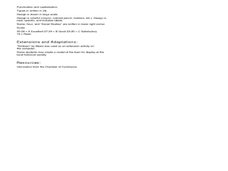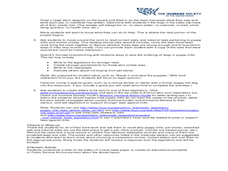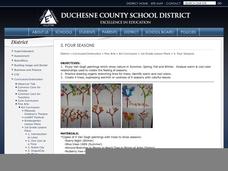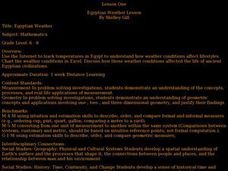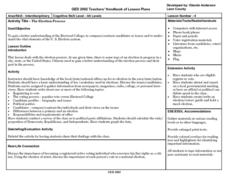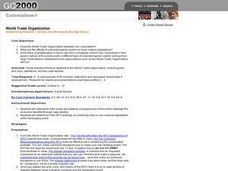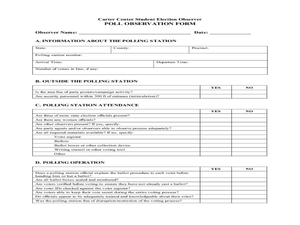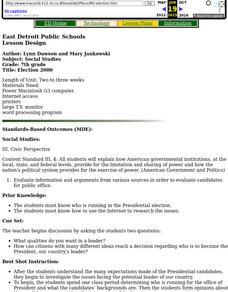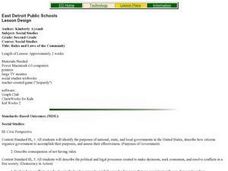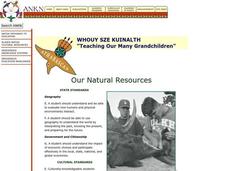Curated OER
Birth Control By Law? - Legislative Hearing
Learners participate in a mock legislature. In this American justice system lesson, students follow the provided steps to participate in a simulation that requires them to debate a proposal for mandatory birth control for substance abusers.
Curated OER
Spending Money
First graders practice adding monetary values. In this money lesson, 1st graders discuss fair trades and then use coin values to purchase items from a class store. A video titled "Blossom and Snappy Go to the Bank, Part Two".
Curated OER
Change for the future: Redesigning Maquoketa
Sixth graders research a problem to be solved in their town, develop a rationale as to why they should act on this problem, and present their ideas to the class and their community. In this problem solving lesson plan, 6th graders...
Curated OER
What is a Puppy Mill?
Students consider community and legislative efforts to stop puppy mills. In this animal welfare lesson, students discuss the needs of pets and determine how puppy mills do not meet the needs of animals. Students research animal...
Curated OER
Four Seasons
First graders examine and describe the characteristics of the four seasons. Using a computer, they write one sentence about each of the four seasons and draws an illustration to accompany it. They present each drawing and sentence to the...
Curated OER
Egyptian Weather Lesson
Students chart temperatures in Egypt on spreadsheet to determine how weather conditions affect lifestyles.
Curated OER
Judges in the Classroom Lesson Plan Juvenile Justice- Disposition
Students investigate what a disposition is in juvenile court in Washington state. They analyze the penalties that can be imposed on a juvenile offender.
Curated OER
Technology and Globalization
Ninth graders examine the global effects of information technology in the areas of health, education, and government. They role play as officials trying to improve information technology.
Curated OER
The Election Process
Students examine how Electoral College works, compare and contrast candidates or issues, and discuss importance of becoming registered, active voting individuals.
Curated OER
Give a Hoot - Don't Pollute at Black Bayou Lake
Fourth graders visit Black Bayou Lake refuge to observe the effects of land and water pollution. They photograph examples of pollution. They list the effects of land and water pollution. They write a persuasive letter to convince others...
Curated OER
Landforms And The Oregon Trail
Fourth graders investigate the historical context for the founding of The Oregon Trail. They conduct research to put together the events that led to the geographical route that was taken. The lesson also strengthens geography skills with...
Curated OER
Democracy is Cool
Students discuss the components of a representative democracy. In groups, they create a t-shirt that shows the components and why it is "cool" to live in a democracy. As a class, they examine the concept of the common good and how...
Curated OER
CANDIDATE COMPARISON
Students identify the names of major contemporary political parties. They explain why a person might choose to vote for one candidate for President of the United States over another candidate. They identify the two major political...
Curated OER
Election Voting Systems
Young scholars discuss the Afghan elections and times when they have voted, i.e. student council, American Idol. Cooperatively, they create definitions for election, local council election, national government election, candidate,...
Curated OER
About the U.S.A.
Students research the United States and discover its different climate zones, geographical features, animal life, and various cultures. Students complete a research chart using books, encyclopedias and the internet and present their...
Curated OER
World Trade Organization
Students determine if the social and political consequences of free trade outweigh the economic benefits through case studies. They determine of the World Trade Organization willingly or unwillingly aids in neo-colonial exploitation of...
Curated OER
Second Graders on the Map
Second graders explore the various types of maps. They examine the differences between street maps and aerial photographs. Students identify various features on each map. They use cardinal directions and the compass rose. They write...
Curated OER
The Palmer "Red Raids"
Students explore how Americans reacted to communism. In this Red Scare lesson, students listen to their instructor present a lecture regarding the details of the Palmer "Red Raids" and its implications. Students respond to...
Curated OER
Plea Bargaining
Students explore plea bargaining and list the advantages and disadvantages of it.
Curated OER
Observing Elections Around the World
Students examine elections in countries around the world. In this elections lesson, students watch a video segment regarding election observations and then access selected websites to research specified elections. Students prepare...
Curated OER
Math: What's My Rule?
Second graders discuss the reasons for rules after reading Clean Your Room, Harvey Moon. Connecting the need for rules to math, they play a game called What's My Rule? using spinners to apply operations to given numbers. Working in...
Curated OER
Election 2000
Seventh graders explore issues facing the potential leader of our country, form opinions about the candidates representing the two major political parties, research election material and choose candidates, conduct debates, and vote in...
Curated OER
Rules and Laws of the Community
Second graders recognize and identify the need for rules in school. They also discuss the importance of safety rules at school, home, and in the community. They illustrate a rule which they have learned in class, and write letters to the...
Curated OER
Our Natural Resources
Students discuss key terms used to describe ecosystems and how humans are altering natural resources. They listen to the book, Grandfather's Wisdom, and list the renewable and nonrenewable resources they have used or consumed in the past...


